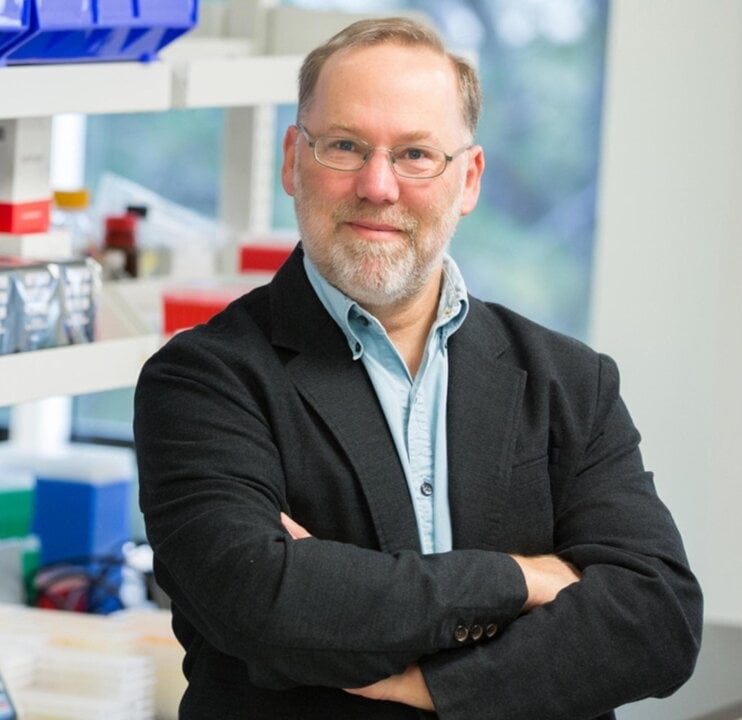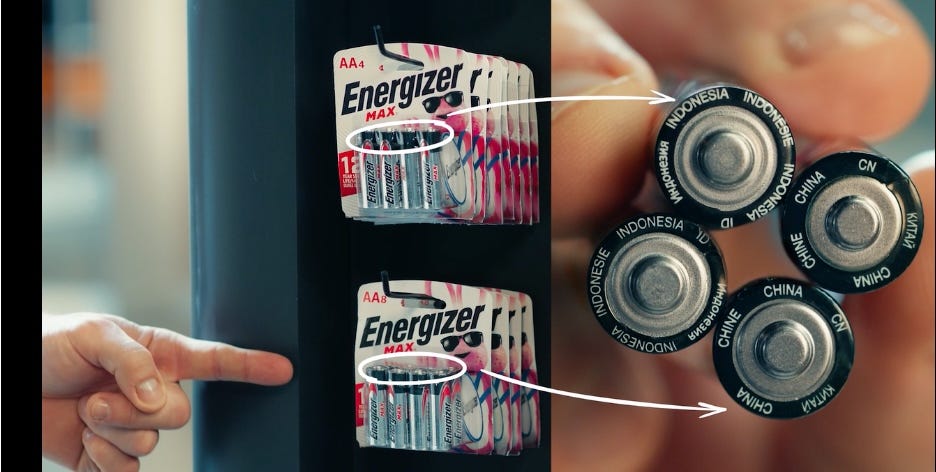Another Nobel for the For-Profit Sector
Plus, Buffett-owned Duracell touts “built in the USA”
A year ago (“A Nobel for Google,” October 9, 2024), commenting on The Royal Swedish Academy of Sciences announcing Demis Hassabis and John Jumper of Google DeepMind as two winners of the 2024 Nobel Prize in Chemistry, I wrote:
there is a market for faculty talent, too, and there the choices include not only the academy but also industry. Just as physician-researchers sometimes leave academic medicine for pharmaceutical companies, the engineers, chemists, physicists, and computer scientists have choices, too. They can make careers in universities or in industry, or try to do both simultaneously. The worse the conditions become in academia—poisonous faculty politics, cancel culture, performative “wokeness,” the decline of meritocracy in favor of other values such as “equity” or bureaucracy—the greater the relative attraction of choosing to make a career instead at Google or some company that will be the next Google….Perhaps the risk of a talent exodus, “brain drain,” from academia to industry, will put some market pressure on higher education to create conditions that are conducive to scholarship. …The Nobel for Google is a reminder that universities aren’t the only places where significant discoveries happen….what Google and similar innovative companies are doing are providing healthy competition to academia’s monopoly on scientific research and discovery. That’s prizeworthy.
The Nobel prizes for 2025 are still being announced, but already one of this year’s awards—one of the Nobel Prizes in Physiology or Medicine—has gone to a researcher working at a for-profit company rather than at an academic medical center.
Frederick Ramsdell made the news mainly for being unreachable and “off the grid,” hiking in Montana near Yellowstone National Park. But also newsworthy is his work affiliation, at a company called Sonoma Biotherapeutics, Inc., of which he is a co-founder. Google Ventures is an investor in the company, so you might even, by an expansive definition, chalk it up as yet a fourth Nobel for Google in two years, which is more than most universities have racked up in that timespan.
The university presidents are fond of touting their institutions’ Nobel prizes as independent external validation of their excellence. But validation comes from markets as well as from prizes. To make it in the private sector you need to not only impress the Nobel committee but provide value to customers and earn the confidence of investors. Scientists will have to decide for themselves which sort of institution is right for them at which stage of their careers. Both have their advantages, and they can also work together. That is a point Ramsdell himself made in an interview posted on the Nobel website: “there is this interplay between what you can do in a biotech and then what you can do in academia, and they really feed off each other very well, if you’re lucky and take advantage of it.”
Buffett-owned Duracell touts “built in the USA”: On August 6, 2025, we noted “Made-in-America Is Making a Comeback,” citing a Walmart commercial, Buck Mason, and J. Press. That piece said:
to understand what’s happening in America, you need to get beyond the academic economists and the legacy media journalists reliant on the academic economists, and watch some of the cultural signals. There are lots of challenges to bringing back American manufacturing, from the academic economists confidently predicting that it won’t happen and that it would be a mistake to try, to the more practical difficulties of finding workers who will come to work consistently. Yet there are indications that consumers have some appetite for it. And generally in America, consumers get what they want.
Now comes an additional data point: A television commercial for Duracell batteries. Duracell is owned by Warren Buffett’s Berkshire Hathaway.
The commercial, headlined, “Built in the USA,” notes that Duracell batteries are assembled in Georgia, while competitors, such as Energizer batteries, are manufactured in China. It’s a little ironic because Buffett/Berkshire for a while had an investment in a Chinese battery company, BYD. Berkshire is so decentralized and Buffett is so hands-off that he probably had nothing to do with this particular television commercial. But whoever is in charge of marketing Duracell batteries seems to understand that at least some segment of the U.S. customer population prefers a made-in-America product to one that is made in China.
You can call that preference isolationism or mercantilism or xenophobia or ignorance of the economic benefits of free trade, or you can call it common sense wisdom about the nature of Communist China, wisdom that is lacking in some of our finest economics departments. Maybe it is a mix of both.
Thank you: This issue of The Editors was written and edited in the USA. If you know someone who would enjoy or benefit from reading The Editors, please help us grow, and help your friends, family members, and associates understand the world around them, by forwarding this email along with a suggestion that they subscribe today. Or send a gift subscription. If it doesn’t work on mobile, try desktop. Or vice versa. Or ask a tech-savvy youngster to help. Thank you to those of who who have done this recently and thanks in advance to the rest of you.




